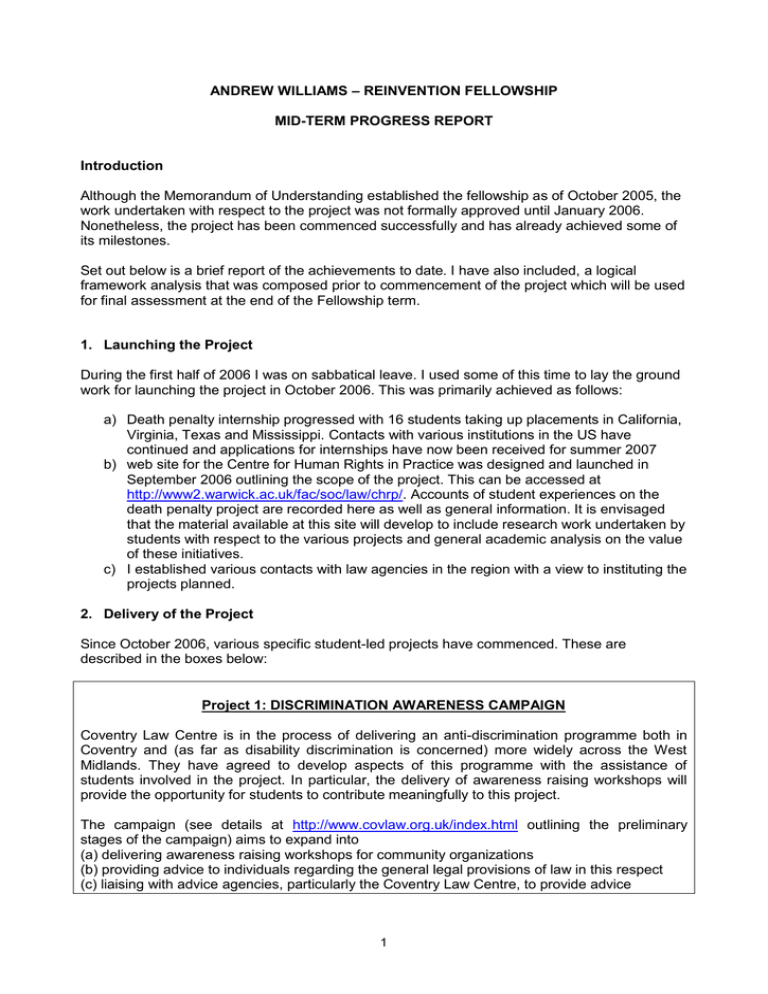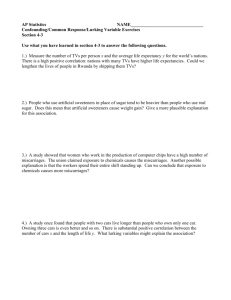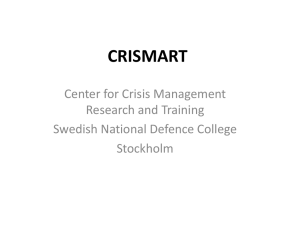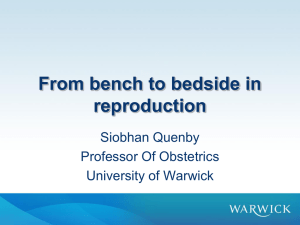– REINVENTION FELLOWSHIP ANDREW WILLIAMS MID-TERM PROGRESS REPORT
advertisement

ANDREW WILLIAMS – REINVENTION FELLOWSHIP MID-TERM PROGRESS REPORT Introduction Although the Memorandum of Understanding established the fellowship as of October 2005, the work undertaken with respect to the project was not formally approved until January 2006. Nonetheless, the project has been commenced successfully and has already achieved some of its milestones. Set out below is a brief report of the achievements to date. I have also included, a logical framework analysis that was composed prior to commencement of the project which will be used for final assessment at the end of the Fellowship term. 1. Launching the Project During the first half of 2006 I was on sabbatical leave. I used some of this time to lay the ground work for launching the project in October 2006. This was primarily achieved as follows: a) Death penalty internship progressed with 16 students taking up placements in California, Virginia, Texas and Mississippi. Contacts with various institutions in the US have continued and applications for internships have now been received for summer 2007 b) web site for the Centre for Human Rights in Practice was designed and launched in September 2006 outlining the scope of the project. This can be accessed at http://www2.warwick.ac.uk/fac/soc/law/chrp/. Accounts of student experiences on the death penalty project are recorded here as well as general information. It is envisaged that the material available at this site will develop to include research work undertaken by students with respect to the various projects and general academic analysis on the value of these initiatives. c) I established various contacts with law agencies in the region with a view to instituting the projects planned. 2. Delivery of the Project Since October 2006, various specific student-led projects have commenced. These are described in the boxes below: Project 1: DISCRIMINATION AWARENESS CAMPAIGN Coventry Law Centre is in the process of delivering an anti-discrimination programme both in Coventry and (as far as disability discrimination is concerned) more widely across the West Midlands. They have agreed to develop aspects of this programme with the assistance of students involved in the project. In particular, the delivery of awareness raising workshops will provide the opportunity for students to contribute meaningfully to this project. The campaign (see details at http://www.covlaw.org.uk/index.html outlining the preliminary stages of the campaign) aims to expand into (a) delivering awareness raising workshops for community organizations (b) providing advice to individuals regarding the general legal provisions of law in this respect (c) liaising with advice agencies, particularly the Coventry Law Centre, to provide advice 1 (d) advising and reporting to advice agencies generally on the strategies for making the public aware of their rights in this field (e) delivering training on diagnostic interviewing for non-lawyers in order to identify discrimination problems. The students will work closely with the Law Centre staff but will be supervised at all times by Law School members with regard to the actual tasks to be undertaken. Students may contribute to all five task-areas referred to above as well as: (a) undertake research into the current state of discrimination law in the UK (b) providing general advice as to the state of the law to individuals who may request it at workshops and potentially on telephone advice lines (c) reporting to the principal in writing on issues arising from conducting workshops (d) public media opportunities, and speaking engagements An initial training session was attended by 40 students from whom 10 have been chosen to engage in the project. Four students will have observed community advice sessions by end December 2006, with a full training programme commencing January 2007. Project 2: CRIMINAL JUSTICE PROJECT The Criminal Justice Project was launched in November 2006. It emerges from a desire to construct an independent and possibly unique scheme inspired by the movement that has developed in response to infamous miscarriages of justice in the UK. Both the governmentcreated Criminal Cases Review Commission and the independent Miscarriages of Justice Organisation and Innocence Projects represent this development. The fundamental aim of the Project is to make an independent contribution to the movement whilst at the same time providing students with vital experiential learning opportunities in the field of human rights and criminal justice. The students will be engaged in (a) assisting in the establishment of the Project and its initial administration and (b) dealing with cases if or when they are taken on and (c) undertaking general research on issues relevant to miscarriages of justice. The main purposes of the Project are to: 1) encourage, co-ordinate and support projects related to issues of miscarriages of justice within the UK 2) facilitate the participation of postgraduate and undergraduate students in research and experiential learning opportunities in this field 3) encourage the publication and wider dissemination of scholarly work on miscarriages of justice in practice 4) form links with organisations and practitioners with a view to establishing referral systems and to sharing experiences and knowledge 5) act as a depository of information and reflection accumulated from students, practitioners, and academics involved in the Project. The Project will explore a range of possible activities. These will include the following: conducting research into evidence/law or undertaking investigations on behalf of an agency/law firm with regard to a specific individual who claims to have suffered a miscarriage of justice conducting thematic research on issues that appear to have contributed to miscarriages of justice generally in the UK 2 researching, preparing and publishing academic material on subjects related to miscarriages of justice designing and maintaining a web site recording the work of the Project contributing to advocacy campaigns related to general or specific miscarriages of justice issues integrating the work of the Project into specific subjects in the Law School’s (and potentially other departments) curriculum To assist in the design of the project two students attended the national workshop on establishing legal services of this nature held at University of Bristol in October 2006. Since that time, 20 students have been chosen to form 5 teams of four to undertake the work of the project. This is due to commence in January 2007. Project 3: CIVIL JUSTICE PROJECT This project has been designed to form teams of students willing to undertake research projects for human rights practitioners in the community. A formal link has been established with Public Lawyers, a firm of solicitors in Birmingham, with a view to conducting investigations for use in communal actions against, in particular, local communities. Seven students have been identified to undertake this project after an application and selection process in December 2006. It is envisaged that work will commence again in January 2007. 3. Continuation of the Project The above demonstrated the substantial groundwork that has been undertaken with a view to realising the overall project. Student interest has been extremely intense, with over 80 applications being received for all the projects on offer. The projects will form the basis for a conference on experiential learning and research-centred legal pedagogy at the end of 2007, although it might be more effective to deliver this as a specific stream at the national LILI conference held at Warwick in 2008. 4. Current Expenditure Currently, approximately £4,000 has been committed to undertake the project. This includes the services of an assistant, travel expenses, and training fees in relation to some specialised work on the projects. Full details can be provided if required. Andrew Williams 12 December 2006 3 ANNEX: LOGICAL FRAMEWORK ANALYSIS – HUMAN RIGHTS PROJECT Overall Objectives Description Indicators of Achievement Sources of verification Assumptions To construct a student experiential learning project related to issues of human rights 1. law school staff identified with specific responsibilities 2. written protocols regarding working methods 3. students enlisted 4. established relationship with outside agencies 1. staff confirm responsibilities 2. protocols drafted 3. students identified 4. protocols with outside agencies signed Law School and University approval obtained or unnecessary To construct the infrastructure of the Project To engage law students in Project design and implementation 1. management Documents in place 2. arrangements for work agreed 3. work undertaken 1. web site 2. manual for Project available 3. feedback reports/journals from students on work 1. Outside agencies engaged by Sept 2006 2. Students engaged 3. Referrals for Project work provided 4. access to web site agreed web site launched Project management in place Project work commenced Student learning enhanced relationship with outside agencies established 1. 2. 3. 4. 1. active web page 2. manual of documents available 3. Protocol signed 4. letters of instruction from outside agencies 5. questionnaires + review of student feedback 1. web page maintained at Law School 2. students available for project feedback 3. Protocol agreed with outside agencies Immediate Objective Expected Results 1. 2. 3. 4. 5. Web site in place documents produced case/project referred student questionnaire and informal feedback 5. Protocol with outside agencies in place 4



